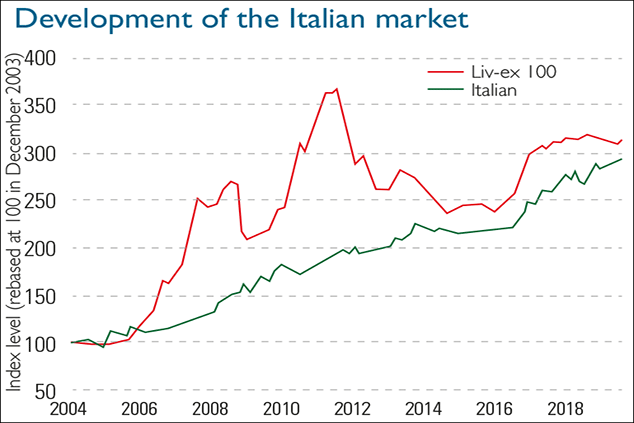How to invest in fine wine
Wine can be an appealing investment – just don’t drink it all, says Chris Carter.

Get the latest financial news, insights and expert analysis from our award-winning MoneyWeek team, to help you understand what really matters when it comes to your finances.
You are now subscribed
Your newsletter sign-up was successful
Want to add more newsletters?

Twice daily
MoneyWeek
Get the latest financial news, insights and expert analysis from our award-winning MoneyWeek team, to help you understand what really matters when it comes to your finances.

Four times a week
Look After My Bills
Sign up to our free money-saving newsletter, filled with the latest news and expert advice to help you find the best tips and deals for managing your bills. Start saving today!

Wine can be an appealing investment just don't drink it all.
Unlike fine art, you can't enjoy fine wine as an investor. If you do, you will be literally drinking away your profits. You can't even enjoy looking at the labels really serious investors store their wine in government-licensed bonded warehouses.
Octavian Vaultsand London City Bond are two such providers in Britain. Storing your wines here will ensure they are kept in a controlled environment, and out of the reach of the tax man wines not destined for the UK market avoid having VAT and duty slapped on them. When you sell them, you do so "in bond".
MoneyWeek
Subscribe to MoneyWeek today and get your first six magazine issues absolutely FREE

Sign up to Money Morning
Don't miss the latest investment and personal finances news, market analysis, plus money-saving tips with our free twice-daily newsletter
Don't miss the latest investment and personal finances news, market analysis, plus money-saving tips with our free twice-daily newsletter
Naturally when storing wine in bonded warehouses, there are also fees and insurance to consider. (That said, if you do cave in to temptation, you can have the wine delivered to you. You will have to pay duty and VAT, of course, but note that VAT is paid on the original sale price of the wine not its present value).
So be warned that when you invest in wine, any warm feeling you will be enjoying will come not from the alcohol, but from knowing your assets are quietly rising in value (hopefully).
Liv-ex, the global marketplace for the wine trade, keeps tabs on what's hot. The top 1,000 bottles appreciated by 48.35% over the last five years, as measured by the benchmark Liv-ex Fine Wine 1000 index. That said, the index has risen by only 0.11% over the past year.
So what's going on? Bordeaux and Burgundy in France are the classic regions for wine investors. Burgundy, in particular, has hit heady heights with an overall 94.9% gain over five years, according to the Liv-ex Burgundy 150 index. Last year, a bottle of 1945 Romane-Conti fetched a record-breaking $558,000 at Sotheby's in New York, while another sold for $496,000 at the same auction.
But like a reveller that has stayed too long at a party, the French market is showing signs of slipping into a funk. The index was down by 6.2% in the year to the end of June.

(Source: Liv-ex)
The wines that might be worth laying down today
Italian wine is hardly new. In 2017, archaeologists in Sicily found wine residue in pots, suggesting that wine has been made in this part of the world for at least 6,000 years. But when it comes to the investment scene, it may surprise you to learn that Italian wine is a relative newcomer.
Like the French market, Italian wine is dominated by two main regions in this case, Tuscany and Piedmont. Sassicaia is perhaps the most famous of the "Super Tuscans", while Barolo and Barbaresco are examples of top Piedmontese wines. Italian wines also tend to be steady growers in contrast to the wild swings of the wider wine market, as the chart above from Liv-ex demonstrates.
What's more, the Italy 100 was also the best-performing Liv-ex index this year, gaining 3%. It's not up there with this year's gain on the S&P 500, but it does show promise.
Meanwhile, if you simply want to learn more about wine and have fun while you're doing it, consider the MoneyWeek Wine Club. This month, MoneyWeek wine writer Matthew Jukes has picked his favourite wines fo winter entertaining from Yapp. No sign-up required just go to moneyweekwineclub.com.
Get the latest financial news, insights and expert analysis from our award-winning MoneyWeek team, to help you understand what really matters when it comes to your finances.

-
 How a ‘great view’ from your home can boost its value by 35%
How a ‘great view’ from your home can boost its value by 35%A house that comes with a picturesque backdrop could add tens of thousands of pounds to its asking price – but how does each region compare?
-
 What is a care fees annuity and how much does it cost?
What is a care fees annuity and how much does it cost?How we will be cared for in our later years – and how much we are willing to pay for it – are conversations best had as early as possible. One option to cover the cost is a care fees annuity. We look at the pros and cons.